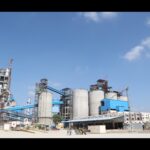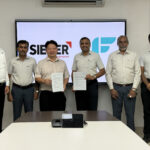We are working on a number of investment opportunities says Richard Boocock, Senior Vice President, Chief Information Officer and Special Advisor to the Chairman, Air Products
With strict guidelines, the government has allowed organisations to restart their business. What are the operational strategies you have adopted to commence your business taking into consideration safety concern of the employees as well growth of the organisation?
One of the privileges we have at Air Products is that many of our products and services are considered to be essential in times of a national emergency or crisis. The hydrogen that we supply to refineries is essential to produce transportation fuels, and the oxygen that we supply from our air separation plants is critical for hospitals and clinics, especially at a time of a global pandemic. With this comes a great responsibility – we are required to keep our plants operating and to keep these critical customers supplied. We do this with an absolute focus on safety – for our employees, our customers and the communities in which we operate. At Air Products we believe that nothing is more important than safety. Since the beginning of the COVID-19 pandemic, we have put important protocols and procedures in place to help keep our employees, families, customers and communities safe while continuing to run our facilities, provide the critical products and services that society needs, and compete to win important projects.
Air Products has also been very adept and swift to respond to the necessary operational and work-style changes. As a responsible employer we have been following all government directives and applying the policies and structures we already have in place to enable us to respond quickly during this time. Our Employee Assistance Program, strong and consistent leadership communications on the importance of maintaining safety standards; the ability to connect virtually, alongside a dedicated crisis management team, have given reassurance and confidence to our employees; and has meant we have been able to continue to manage our business whilst also attracting and recruiting new employees into our organization. We have said many times that we appreciate our people for their hard work and dedication. In these times, we have never been prouder of what we have been able to do and what we will continue to do, standing together.
What is the total market size of industrial gases in India? How much market share do you command in the Indian market? What are your plans to increase your market size in India?
India is an important market for Air Products’ industrial gas business. The overall market was expected to grow at a CAGR of over 11% to surpass $ 3.9 billion by 2023 as a result of growing demand from the metal industry, particularly steel. Industrial gas consumption grows at a multiple of manufacturing output, so as general manufacturing develops in India, and the sophistication of manufacturing increases in India, we expect industrial gas growth to be a multiple of industrial output/GDP growth. Air Products and our joint venture INOX-Air Products have a market leading position across the major manufacturing sectors in India. Advances in automobile manufacture, increases in both refinery complexity and capacity to meet the impending fuel demand, as well as chemicals, healthcare and food & beverages sectors are all expected to support steady growth of industrial gases in India. Of course, all of us have seen the initial economic impact of the global pandemic and associated contraction in India’s GDP, so it is difficult to predict the near-term growth of the sector and our market size. However, we are confident that industries and businesses will recover and the future for industrial gases in India continues to be a bright one.
Please share with us your proprietary technologies you offer for Oil and gas industry?
Our company has almost 80 years of experience in developing and providing leading-edge industrial technologies which support a wide variety of industries and initiatives. We have established leading positions in diverse end markets, including energy, chemicals, metals, manufacturing and electronics. Air Products’ leading-edge technologies are driven by innovation. Here are just some of the examples of our offerings to the gas and oil and other industries. We make remote natural gas economical to transport with liquefied natural gas heat exchangers. We provide syngas solutions to convert coal, high sulfur liquids or natural gas into syngas, which can be used in the production of chemicals, synthetic liquid fuel, lubricants, and to generate power. We make hydrogen for cleaner transportation fuels and for fuel cells, which generate water as the only emission. We enable metals, glass and cement producers to use less energy, lower their emissions, and improve productivity with our oxy-fuel and oxygen enrichment technologies. We provide the food and beverages industry with solutions to keep produce fresh with liquid nitrogen and carbon dioxide cooling and freezing technology, helium for magnetic resonance imaging and medical gases for sustaining life.
How are you integrating sustainability as well as technologies such as IoTs with your proprietary technologies?
Sustainability is one of our core values and business drivers. We are focused on serving energy, environmental and emerging markets, all of which are central to the sustainability of the world. We have significant opportunities to help solve the world’s urgent environmental issues through our industrial gases and large-scale gasification, carbon capture and hydrogen solutions. Our 2019 results show that we have avoided CO2 emissions by our customers and downstream users, equivalent to the emission from 15 million cars and 2.5 times of our own direct and indirect CO2 emissions. At Air Products, we are driven by an important ambition to innovate alongside our customers and help them be more sustainable. We produce products that improve energy efficiency, reduce environmental impact and address societal needs such as health, safety and improving quality of life. We track our progress through avoided carbon dioxide (CO2), emissions and the revenue contribution of our sustainable offerings.
Our cloud based IIoT (Industrial Internet of Things) system enables us to track product levels continuously at the site, ensuring the customer has the needed product while taking delivery trucks off the road by reducing deliveries by almost one-third. Air Products successfully monitors and maintains approximately 400 industrial gas facilities in its fleet of operating plants around the world using its proprietary ProcessMD IIoT platform for predictive monitoring and fault diagnosis. At the foundation of this technology are predictive models built uniquely for each plant or piece of equipment. These data-driven, auto-adaptive models provide advanced alerts of subtle abnormalities and deviations from expected behavior across a whole plant for specific components. This allows for more efficient operations in real time, opportunities for reduced power consumption, increased production, and reduction in vent losses.
What are the challenges facing the industry?
We consider the current downturn in industrial activities and the decline in demand for industrial gases during the ongoing pandemic to be a short-term issue, and we can already see recovery in manufacturing activity. Challenges for the industrial gases industry in India are similar to those facing manufacturing industry in general – time to obtain land, permits, and utilities, and the availability of good quality, stable, reliable power. We see many states in India making good progress in these areas, with the establishment of special economic zones, industrial parks etc., and more should be done to promote the attractiveness of India for manufacturing investment.
There is a paucity of skilled manpower in India. What are the Skill nurturing trainings you conduct?
At Air Products we recognize that colleagues with different capabilities, cultures, perspectives, and experiences contribute to our ability to stay competitive in the ever-changing global marketplace. That is why we strive to be inclusive of the diversity of our employees, invest in their development and foster a collaborative and respectful work environment where all employees can achieve their true potential. India has a young population, much of which is well educated in an academic sense, but, as in many countries, young people sometimes leave academia with a shortage of lifeskills and workskills. All over the world Air Products has become accustomed to employing people with strong basic skills and most importantly the right attitude and a willingness to commit to our culture of safety, integrity and diversity and inclusion, and then training and supporting them in their continued development and progression. We have a strong emphasis on performance development, career path, knowledge transfer and retention. Our dedicated learning and development team ensures employees are offered continual skill-based and experiential training across various virtual and classroom platforms. The training programs are designed through a systematic assessment of competencies, skill matrix and training needs. Training is never complete without mentoring and Air Products understands that very well.
What are your growth plans for the next three years? Is there a product launch or a new plant or acquisition or merger in the offing?
In 2018, we brought onstream our $400 million investment in Kochi where we set-up an industrial gases plant within the Integrated Refinery Expansion Project (IREP) of the BPCL Kochi Refinery. An expansion to our Kochi facility is currently in commissioning and will come fully onstream later this year, 2020. We are working on a number of investment opportunities which, if all come to fruition, would result in more than $5 billion of investment in India in the next few years. In support of this, we have been expanding our in-house engineering capabilities in India, primarily in our centres in Pune and very recently, Vadodara, which opened in June 2020 in the midst of the pandemic. The team is currently very busy executing projects and providing detailed engineering, procurement, construction and commissioning services for Air Products in India as well as for other parts of the Air Products world. This is a testament of our focus and commitment towards offering innovative solutions through sustained, long-term investments in the Indian market.
Give us a brief scenario of Coal-gasification and R&Ds activities taking place in Coal-gasification In India? How are your Coal-gasification products serving the industry?
Coal is the most abundant indigenous energy resource in India. As per reports by NITI Aayog, presently the 60% of available coal is consumed by the power production units, while steel and cement industries consume around 4% and 7% respectively. There is a significant opportunity for India to utilize clean coal technologies to take advantage of this abundant domestic energy source. Air Products world leading gasification technology, proven to operate with coals similar to the type of high ash coals that India has, can add significant value to the coal through conversion into much needed chemicals such as methanol, ammonia, olefins and even transportation fuels. Combined with carbon capture utilization and sequestration (CCUS), it provides a clean alternative to using domestic coal, consistent with “Aatma Nirbhar Bharat”, self-reliant India. Globally, we have processed more than 100 types of coal to date. Air Products technology has been selected for the Talcher project in India, and this is an example of where using a blend of coal and pet coke significantly increases gasifier reliability and can significantly improve operational stability, efficiency, and syngas output, particularly for operators using high-ash coal.
In recent years, Air Products has acquired leading gasification technologies and has developed in-country execution capabilities to ensure that any coal gasification project in India contributes to “Make in India” as well as “Self-Reliant India”. Our engineering centres in Pune and Vadodara are already working on overseas gasification projects, such as that recently announced by Air Products in Indonesia. Air Products build-own-operate model means that Air Products will provide technology, execute the full EPC, invest in the facility and then operate and maintain the facilitate under a long-term contract with the chemicals offtaker. Air Products gasification technologies and our build-own-operate business model can truly provide an end to end solution for India and provide ‘peace of mind’ that technology, execution, financing and operational risks will be covered by Air Products. The recently announced reforms in development of coal reserves are very exciting, as is the objective declared by the Honorable Prime Minister Shri Narendra Modithat India will be gasifying 100 million tonnes per year of coal by 2030.
Gasification technologies can also benefit refineries by enabling them to convert low-value refinery residues (through the Air Products-Shell joint venture) and petroleum coke into syngas/chemicals/hydrogen and SNG. This is especially the case when alternative technologies, such as steam reforming, rely on higher value feedstocks such as natural gas, LNG, LPG and naphtha, and channels for monetizing residues into bunker fuel, and petcoke into thermal power stations continue to close.









